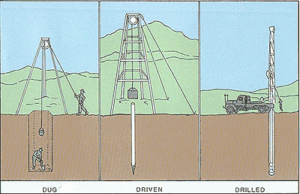A water well is defined as:
An excavation or structure created in the ground by digging, driving, boring, or drilling to access groundwater in underground aquifers. The well water is drawn by a pump, or using containers, such as buckets, that are raised mechanically or by hand.
Water wells are extremely important to all societies. In many places wells provide a reliable and ample supply of water for home uses, irrigation, and industries. Where surface water is scarce, such as in deserts, people couldn’t survive and thrive without groundwater. Though wells were originally hand dug using a shovel and bucket, most areas have went with the cleaner, faster, and less dangerous Driven or Drilled well.

When first installed well drillers will chlorinate or sanitize the well to insure that any harmful bacteria, such as total Coliforms and/or E-Coli, are removed leaving the water safer to drink. After that most people do not give the well a second thought until they have an issue with the well requiring a plumber or well driller to replace parts or they are trying to sell the home and a lender requests a water quality test.
When quality testing is requested several items are looked at, the condition of the components (well head / casing, the pump if accessible, the pressure tank and distribution system), as well as the quality of the water which requires lab testing. When testing reveals quality issues, in most cases, they can be corrected by sanitizing (chlorinating) the water supply by the inspection company (if it is offered), a plumber, or well driller or in some cases installation of a filtering system. When damaged components are found, repair is also required.
Testing your well semi-annually helps address possible concerns before they become expensive repairs.

